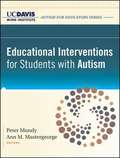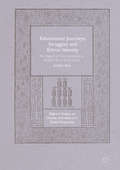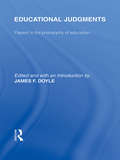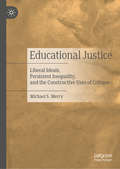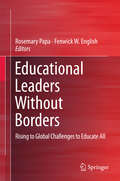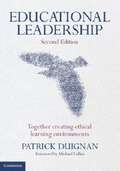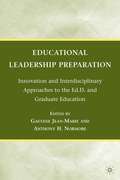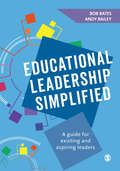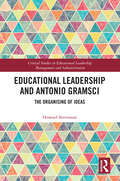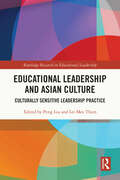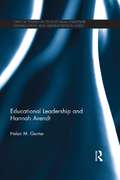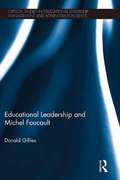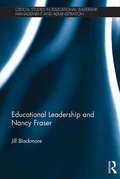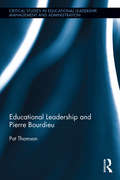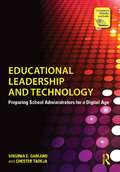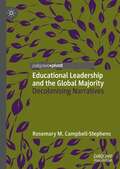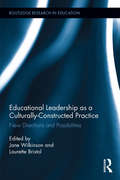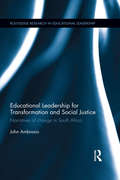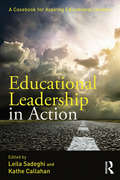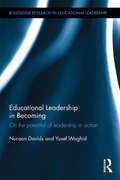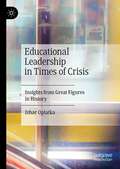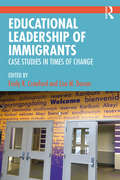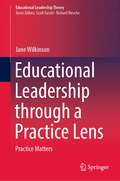- Table View
- List View
Educational Interventions for Students with Autism
by Peter Mundy Ann M. MastergeorgeEducational Interventions for Students with Autism offers educators a vital resource for understanding and working with autistic students. Written by nationally acclaimed experts in the field and published in collaboration with the world-renowned UC Davis M. I. N. D. Institute, the book aims to deepen educators' appreciation of the challenges surrounding autism in a classroom setting and the current best practices in education for autism. To best meet the practical needs of teachers, school administrators, and parents, the book includes integrative summaries throughout, with recommendations for real-world classroom use. Topics covered include: how autism affects student learning, autism and its impact on schools, a teacher's view of autism and the classroom, best practices and challenges of working with students with ASD in the classroom,working with high-functioning autism (HFA) in schools, successful community-school partnerships, options for teacher training, and more.
Educational Journeys, Struggles and Ethnic Identity
by Xinyi WuThis book examines how state schooling in China has economically, culturally, and ideologically had an impact on and gradually transformed a traditional Muslim Hui village in rural Northwestern China. By discussing the interpretation and appropriation of dominant educational discourse of "quality" in the rural context, it illustrates the dichotomies of poverty and prosperity, civility and uncivility, and religiosity and secularity as they are perceived and understood by teachers, parents and students. Based on an original ethnographic research conducted in a secondary school, it further touches upon Muslim Hui students' negotiations of filial, rural, and ethnoreligious identities when they struggle to seek a life of their own in the journey to prosperity. The book introduces audiences to multiple ways in which Muslim Hui students construct and negotiate identities through state schooling, especially the educational heterogeneity experienced by various Muslim youth. It also captures the changing rural-urban dynamic as state schooling continues to guide local formal educational activities as well as create tensions and confusions for both teachers and parents. Most importantly, the book challenges stereotypes about Muslim Hui students in Northwest China being assimilated into the mainstream culture by demonstrating how local Muslims live, study, pray, and fulfil the five pillars of Islam. It will be highly relevant to students and researchers in the fields of education, anthropology, sociology, and religious studies.
Educational Judgments (International Library of the Philosophy of Education Volume 9): Papers in the Philosophy of Education
by James F. DoyleThe topics covered in this volume, originally published in 1973, include the need for a more adequate concept or definition of education, the issue of whether indoctrination is compatible with education, particularly with moral education, and the processes of judging the merits of different approaches to aesthetic education. Two contributors present complementary analyses of the relations between freedom as a characteristic of institutions and the process of learning to be a free man. There is discussion of the neglected subject of rights and duties in education, with special emphasis on the question of a universal right to education. The volume concludes with papers on the relevance of philosophy to the practical judgments of educators and to education as a field of study.
Educational Justice: Liberal Ideals, Persistent Inequality, and the Constructive Uses of Critique
by Michael S. MerryThis book examines the philosophical, motivational, and practical challenges of education theory, policy, and practice in the twenty-first century. There is a loud and persistent drum beat of support for schools, for citizenship, for diversity and inclusion, and increasingly for labor market readiness with very little critical attention to the assumptions underlying these agendas, let alone to their many internal contradictions. Merry does not neglect the historical, comparative international context so essential to better understanding where we are, as well as what is attainable in terms of educational justice. He argues that we must constructively critique some of our most cherished beliefs about education if we are to save the hope of real justice from the rhetoric of imagined justice.
Educational Leaders Without Borders
by Fenwick W. English Rosemary PapaBuilding from the history of inequality in education up to current problems, this text posits viewpoints on how to cultivate humanistic leaders in education to best benefit underserved children around the world. Among perspectives examined are economic, cultural, and political circumstances that benefit some and harm others, creating educational inequality. To illustrate the work that must be done, this book connects vignettes of compelling school issues to educational philosophies, e. g. , Makiguchi's work, to bridge the theoretical and the practical and pose real solutions.
Educational Leadership
by Patrick DuignanThe second edition of Educational Leadership: Together Creating Ethical Learning Environments is a groundbreaking work at the forefront of current research into the ethical challenges inherent to leadership. Patrick Duignan combines a new perspective of leadership as an influence relationship, with a collective ethic of responsibility. Educational Leadership draws together cutting-edge research, theory and best practice on learning, teaching and leadership to assist leaders and teachers to better understand contemporary educational challenges and respond to them wisely, creatively and effectively. This book is indispensable for all system and educational professionals engaged in policy-making, leadership development, leading learning in schools and those in academe responsible for programs aimed at the improvement of learning, teaching and leadership.
Educational Leadership Preparation
by Gaetane Jean-Marie Anthony H. NormoreThis book explores the efficacy of innovative and interdisciplinary approaches to educational leadership preparation implemented at universities across the United States that serve K-12 populations in urban, rural, and suburban contexts.
Educational Leadership Simplified: A guide for existing and aspiring leaders
by Andy Bailey Dr Bob BatesLeading in education is a difficult job to do well. Political, financial and organisational pressures need to be managed smartly and difficult decisions need to be made. Written in Bob Bates' trademark style, this guide offers concise and clear support to help you lead and inspire in education. In collaboration with Andy Bailey, a former headteacher and school inspector with recent Ofsted lead inspection experience, Bob combines practical knowledge of leadership roles in education with robust theories underpinning leadership and management. Covering a wide range of key areas including team-building, coaching, conflict, change and budget management, creating a supportive work environment and working with various stakeholders - this is the go-to companion for anyone who is, or aspires to be, a senior leader in schools, colleges and other educational organisations. ? Also from Bob Bates: Learning Theories Simplified A Quick Guide to Special Needs and Disabilities
Educational Leadership Simplified: A guide for existing and aspiring leaders
by Andy Bailey Dr Bob BatesLeading in education is a difficult job to do well. Political, financial and organisational pressures need to be managed smartly and difficult decisions need to be made. Written in Bob Bates' trademark style, this guide offers concise and clear support to help you lead and inspire in education. In collaboration with Andy Bailey, a former headteacher and school inspector with recent Ofsted lead inspection experience, Bob combines practical knowledge of leadership roles in education with robust theories underpinning leadership and management. Covering a wide range of key areas including team-building, coaching, conflict, change and budget management, creating a supportive work environment and working with various stakeholders - this is the go-to companion for anyone who is, or aspires to be, a senior leader in schools, colleges and other educational organisations. ? Also from Bob Bates: Learning Theories Simplified A Quick Guide to Special Needs and Disabilities
Educational Leadership and Antonio Gramsci: The Organising of Ideas (Critical Studies in Educational Leadership, Management and Administration)
by Howard StevensonThis insightful book explores the life and ideas of Italian Marxist theoretician Antonio Gramsci, and argues his work has considerable contemporary relevance when re-considering educational leadership in today’s age of crises. Gramsci’s theory of hegemony has provided an invaluable intellectual resource for those seeking to bring about radical change in the complex context of contemporary capitalist societies. In particular, his focus on the role of organic intellectuals engaging in an ongoing ideological struggle across economic, political and civil society helps to locate his notion of hegemony as a theory of leadership that is deeply rooted in pedagogical processes. This volume focuses on transformatory change both in and through education, reframing traditional notions of educational leadership as educative leadership, in which leadership for change, within and beyond educational institutions, is understood in pedagogical terms. This volume will be of pivotal interest to academics, researchers, and postgraduates in the fields of educational leadership, the sociology of education, and education policy and politics. Practitioners interested in educational leadership and social theory, and those active in social movements, may also find the book of use.
Educational Leadership and Asian Culture: Culturally Sensitive Leadership Practice (Routledge Research in Educational Leadership)
by Peng Liu Lei Mee ThienProviding a window on educational leadership from an Asian cultural perspective, Liu and Thien’s edited collection describes how educational leadership is linked with national culture in the context of different Asian countries. While much of the scholarship on this topic has been built on Western paradigms, this book examines the measurement of school leadership from a diverse lens by taking cultural context into account while examining educational leadership. Drawing on cross-cultural perspectives, the authors investigate the relationship between leadership for learning and societal culture, in addition to the relationship between leadership style and culture. The text provides a theoretical basis for understanding leadership in the context of Asian countries, and offers practical suggestions for identifying effective, and culturally sensitive leadership practices in similar cultural contexts. An excellent resource for graduate students, researchers in comparative education, educational practitioners looking to improve their education practices, and anyone interested in cultural leadership practices.
Educational Leadership and Hannah Arendt (Critical Studies In Educational Leadership, Management And Administration Ser.)
by Helen M. GunterThe relationship between education and democratic development has been a growing theme in debates focussed upon public education, but there has been little work that has directly related educational leadership to wider issues of freedom, politics and practice. Engaging with ELMA through the work of Hannah Arendt enables these issues of power to be
Educational Leadership and Michel Foucault (Critical Studies In Educational Leadership, Management And Administration Ser.)
by Donald GilliesDrawing from the ideas of Michel Foucault, this book offers a critical examination of today‘s dominant discourse of educational leadership. Foucault‘s understanding of critique is as apermanent ethos in which humans explore the nature of their existence but at the same time query the limits imposed upon them, and probe opportunities for increasi
Educational Leadership and Nancy Fraser: Nancy Fraser And Iris Marion Young (Critical Studies in Educational Leadership, Management and Administration)
by Jill BlackmoreDrawing on the work of Nancy Fraser, this book offers a critical view of contemporary educational leadership and reform discourses, exploring how her key concepts of redistribution, recognition and representation may apply to social and therefore educational justice. Fraser offers a political and pragmatic reconciliation between feminist, neo-Marxist, critical and post-structuralist theories. This book outlines how Fraser has worked on and worked over theories of social justice and how this can inform how we can understand educational theory, policy and practice generally. In particular, the book focuses on the field of educational administration and leadership (ELMA) as it relates to equity issues such as school choice and inequality, gender and inclusive leadership, and alternative schooling. Fraser’s argument about ‘scaling up’ social justice theory is shown to be highly salient given the emergence of the field of transnational education policy and its role in the context of intensified nation-state and edu-business competition. Overall, through the lens of Nancy Fraser’s unitary framework, this book considers epistemological questions about the nature of knowledge, examines the relationship between the state, the individual, education and social movements, addresses the difficulties and dilemmas which arise due to the intersections of gender, class, race, sexuality and culture in a globalized context, and illustrates how the principles of social justice can be mobilized by leaders in everyday practice. Educational Leadership and Nancy Fraser is an illuminating read for those policymakers, researchers and practitioners engaged in the field of educational administration, leadership and social justice.
Educational Leadership and Pierre Bourdieu: Pierre Bourdieu (Critical Studies in Educational Leadership, Management and Administration)
by Pat ThomsonPierre Bourdieu was one of the most important thinkers of the twentieth century. He argued for, and practiced, rigorous and reflexive scholarship, interrogating the inequities and injustices of modern societies. Through a lifetime’s explication of the ways in which schooling both produces and reproduces the status quo, Bourdieu offered a powerful critique and method of analysis of the history of schooling, and of contemporary educational polices and trends. Though frequently used in educational research, Bourdieu’s work has had much less take up in Educational Leadership, Management and Administration. Educational Leadership and Pierre Bourdieu argues that ELMA scholars have much to gain by engaging more thoroughly with his work. The book explains each of the key terms in Bourdieu’s thinking tool kit, showing how the tripartite concepts of field, habitus and capitals offer a way through which to understand the interaction of structure and agency, and the limits on the freedom of an individual – in this case an educational leader – to act. Educational Leadership and Pierre Bourdieu offers an analysis of dominant trends in ELMA research, examining the kinds of questions asked, projects undertaken and methods used. It provides alternative questions and methods based on a Bourdieusian approach, further readings and a range of exemplars of the application of these tools. The book will be of interest to those whose primary focus is the utility of Bourdieu’s social theory.
Educational Leadership and Technology: Preparing School Administrators for a Digital Age
by Virginia E. Garland Chester TadejaProviding models of exemplary use and the latest research, Educational Leadership and Technology reveals the transformational power of emerging technologies to improve student learning, and explores how leaders can bring about this technology integration. This book provides an overview of roles and strategies expected of effective school leaders, as well as some of the complex issues they face. Authors Garland and Tadeja offer a critical analysis of today's emerging technology, while also addressing the need for collaborative efforts of parents, community, and students to implement technologies effectively. Special Features Include: Full integration of National Technology Standards for Administrators (NETS.A) and the National Education Technology Plan (NETP). Leader reflections from practicing school administrators that provide context of real-world scenarios. "Tips for School Leaders" and end-of-chapter questions that encourage student engagement with the text. "School Administrator's Technology Leadership Self-Assessment," a unique and impartial survey in each chapter with self-scoring guide that helps readers determine their technology use and readiness for implementation. A robust companion website with PowerPoint Slides, strategies, and links to website and video resources which will reflect changes in technology, policy, and practice. Discussion of the newest and emerging technologies, including Cloudware, social media, virtual manipulatives, and e-games. Educational Leadership and Technology is an important resource for new and aspiring elementary, middle, and high school principals as well as superintendents and technology coordinators.
Educational Leadership and the Global Majority: Decolonising Narratives
by Rosemary M. Campbell-StephensThis book introduces a term for our times, ‘Global Majority,’ as conceptualised within the context of school leadership. It examines the processes and impact over time of racially-minoritising up to eighty-five percent of the world’s population. The chapters illustrate how a decolonised cognitive reset from a minority to majority orientation moves practice from a place of subordination to one of agency and efficacy. By reconnecting the people of the Global Majority with their narratives and the social and historical linkages that they have always had, the book potentially contributes to a different globality; where interdependence is not driven by the economic greed of the minority, but the social and very human needs of the majority.
Educational Leadership as a Culturally-Constructed Practice: New Directions and Possibilities (Routledge Research in Education)
by Jane Wilkinson Laurette BristolThis edited book collection disrupts received notions of educational leadership, culture and diversity as currently portrayed in practice and theory. It draws on compelling studies of educational leadership from the global north and south, as well as from a range of ethnic, religious and gendered perspectives and critical research approaches. In so doing, the book powerfully challenges contemporary leadership discourses of diversity that reproduce essentialising leadership practices, binary divisions and asymmetrical power relations. The various chapters contest and move beyond exhortations for leadership in increasingly diverse societies; revealing through their rich portraits of the hybridity of leadership practice, the shallowness of diversity discourses that are framed as something "we" (the culturally homogenous) leader do to (heterogenous) ‘others’. The volume is more than critique. Instead it offers readers new directions and possibilities through which to understand, theorise and practise educational leadership in the twenty first century. In portraying leading as a "relational practice in contexts of cultural hybridity" (Blackmore, this volume), it extends critical theories for and of leadership practice, examining the intersectionality between leadership and a range of social categories, and challenging notions of leadership as a singular construct. Compelling research narratives reveal educational leadership practice as nuanced, temporal, site specific and prefigured by traditions and cultural understandings that reach beyond a simplification of educational leadership as understood through unitary lenses of race, gender or ethnicity. This book is essential reading for academics and students of educational leadership and management, as well as administrators.
Educational Leadership for Transformation and Social Justice: Narratives of change in South Africa (Routledge Research in Educational Leadership)
by John AmbrosioEducational Leadership for Transformation and Social Justice examines the relationship between the lived experiences of educational leaders at the University of the Free State in South Africa and how they think about and practice leadership for transformation and social justice. Based on biographical information, public speeches, published writings, and in-depth semi-structured face-to-face interviews, the book presents and analyses seven chapter-length narratives of these leaders. This book explores how some leaders at the University of the Free State – from the vantage point of various racialized and gendered identities, and generational experiences – conceptualize and enact leadership for transformation and social justice. Ambrosio argues that there are certain values, beliefs, concepts, principles, and ways of thinking that cut across their experiences and demographic differences. The narratives are presented in the leaders’ own words, and describe how their lived experiences shaped their values and identities, and inform how they think about and practice leadership for transformation and social justice. One convergence that emerged among these leaders is that their leadership is an extension of who they are, of their core values, identities and ethical commitments. Another is that they are motivated by visions of change that go beyond the University; by bigger dreams that infuse their work with meaning and purpose. With its in-depth analysis of the narratives, this book will provide educational leaders who have an orientation towards transformation and social justice with insights that enable them to think differently about how to make the policies, programs, and institutional culture of their own universities more equitable and just. It will appeal to academics, researchers and postgraduate students in the fields of education, educational justice, higher education, educational leadership and change, social justice and racial justice.
Educational Leadership in Action: A Casebook for Aspiring Educational Leaders
by Leila Sadeghi and Kathe CallahanEducational Leadership in Action provides 24 complex, real-life, accessible cases to provoke and stimulate conversation around practical problems that confront educational leaders today. Written by a diverse group of educators, these cases cover a wide range of topics, including: teacher evaluations, educational reforms, contract negotiations, school safety, cultural differences, undocumented students, and social media. To foster additional meaningful discussion and debate, this resource includes responses to each of the cases, written by a range of experts. The organization and unique approach of Educational Leadership in Action allows for flexible use in courses for aspiring leaders to supplement core readings, reinforce central concepts, exemplify theory, and provide grounded examples to encourage learning. This essential compendium of cases and responses prepares future leaders to frame problems, identify solutions, and develop strategies to meet the multiple challenges and competing demands in rapidly changing education contexts.
Educational Leadership in Becoming: On the potential of leadership in action (Routledge Research in Educational Leadership)
by Nuraan Davids Yusef WaghidEducational Leadership in Becoming reconsiders educational leadership in its current forms, and presents a more plausible form of educational leadership to contend with the complexities currently found in universities and schools. Much of the literature in vogue concerning educational leadership ranges from transactional to transformative representations of the concept in relation to educational management and policy, curriculum inquiry and pedagogical action. The primary aim of this book is to revisit some of the dominant understandings of educational leadership and to offer an extended view of the practice along the lines of potentiality and becoming. Davids and Waghid argue that all current forms of educational leadership are insufficient to enact responsible human action, particularly when it comes to addressing the combined issues of globalisation and equitable redress and transformation, whether in relation to leading schools or universities. The primary objective of the book is to draw on the Agambian notion of becoming in order to show that an educational leadership in becoming is better placed to not only address the myriad challenges besetting education, but to also enhance the potential of leadership in action. The book addresses an international audience by analysing conceptions of transformative leadership and should be read by anyone who is interested in education and educational leadership, as well as the impact of neoliberal agendas on education and society. It should also appeal to those interested in the philosophy of education.
Educational Leadership in Policy: Challenges And Implementation Within Europe
by Nikša Alfirević Jurica Pavičić Ágúst Hjörtur Ingþórsson Dijana VicanThis book analyzes the challenges of developing and implementing effective policies for educational leadership in South-East Europe (SEE) and the Nordic-Baltic region. While individual countries from the Nordic-Baltic region are praised for their educational achievements, the SEE region could be considered as a (post)transitional landscape: these two educational contexts present their own unique challenges, notably international benchmarking and the ‘Europeization’ of educational policy. Seamlessly integrating theoretical framework with the goals and experiences of actors and practitioners, the editors and contributors build an accessible overview of existing policy research and its conflicting theoretical perspectives. Often disregarded by the mainstream literature, the countries and regions chosen provide a snapshot into the challenges of developing policies for educational leadership. This thoughtful yet practical volume will be of interest and value not only to students and scholars of educational leadership in these regions, but to practitioners and policy makers more widely.
Educational Leadership in Times of Crisis: Insights from Great Figures in History
by Izhar OplatkaThis book aims to fill the gap in our knowledge about crisis management in schools, its particular characteristics, and strategies from a historical point of view. It combines knowledge about educational leadership with biographical narratives of great leaders in history who have faced a tremendous crisis successfully and from whom we can learn a lot about effective coping strategies in times of crisis. The leaders in the book represent different nations and organizations, facing political, military, economic or social crises. The book provides a deeper knowledge necessary for preparing for a possible crisis and for managing it in successful ways if it comes and adds novel insights into the field of educational administration and leadership in the twenty-first century.
Educational Leadership of Immigrants: Case Studies in Times of Change
by Emily R. Crawford Lisa M. DornerThis book prepares current and future educational leaders to adapt to the changing terrain of U.S. demographics, education, and immigration policy. Educational Leadership of Immigrants highlights the educational practices and discourses around immigration that intersect with policies and laws, in order to support K-12 students’ educational access and families’ participation in schooling. Drawing primarily on research from the fields of educational leadership and educational policy, this book employs a case study approach to address immigration in public schools and communities; school leaders’ responses to ethical dilemmas; the impact of immigration policy on undocumented students; and the varying cultural, sociopolitical, legal and economic contexts affecting students’ educational circumstances. Special features include: • case narratives drawn from real-life experiences to support the educational needs of immigrant students; • teaching activities and reflective discussion questions pertaining to each case study to crystallize leaders’ knowledge and facilitate their comfort levels in practice; • discussions of current challenges in education facing immigrant students, their families, educators, and school leaders, especially with changing immigration law.
Educational Leadership through a Practice Lens: Practice Matters (Educational Leadership Theory)
by Jane WilkinsonThis book provides the theoretical and analytical resources for an urgent rethinking of the social project of educating and educational leading. It examines what educational leadership is, namely the politics and power of leadership as a practice, and what it can and should be, offering a pedagogical and praxis-informed approach to educational practice. Drawing on research conducted at various Australian schools and education districts, it argues for a reframing of educational leadership as pedagogical practice/praxis to transform theorising and practice in the field. The book provides a rich account of educational leading through a practice lens, bringing into dialogue the theory of practice architectures with site ontologies, Bourdieu’s thinking tools and feminist critical scholarship.The book tracks the practices and praxis of educational leaders as they grapple with the changing landscape and forces of educational policies that have informed Australian education. It reimagines education leadership by integrating Continental and Northern European understandings of pedagogy and praxis as being morally and ethically informed, as opposed to the narrower Anglophone notions of pedagogy as teaching and learning. The book adds to the body of knowledge on the “actual work of leadership” as a “distinct set of practices” that is morally and ethically informed. Readers will find a more holistic understanding of educational leadership practice and praxis, based on the everyday accounts of educational leaders, teachers and students in schools and education districts.
